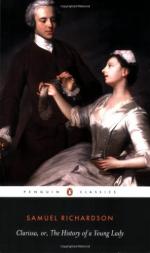You can see I am in a way to oblige you: you see how much she depends upon my engaging for your forbearing to intrude yourself into her company: let not your flaming impatience destroy all; and make me look like a villain to a lady who has reason to suspect every man she sees to be so.—Upon this condition, you may expect all the services that can flow from
Your sincere well-wisher,
J. Belford.
LETTER XXI
Mr. Belford, to Robert Lovelace,
ESQ.
Tuesday night, July 18.
I am just come from the lady. I was admitted into the dining-room, where she was sitting in an elbow-chair, in a very weak and low way. She made an effort to stand up when I entered; but was forced to keep her seat. You’ll excuse me, Mr. Belford: I ought to rise to thank you for all your kindness to me. I was to blame to be so loth to leave that sad place; for I am in heaven here, to what I was there; and good people about me too!—I have not had good people about me for a long, long time before; so that [with a half-smile] I had begun to wonder whither they were all gone.
Her nurse and Mrs. Smith, who were present, took occasion to retire: and, when we were alone, You seem to be a person of humanity, Sir, said she: you hinted, as I was leaving my prison, that you were not a stranger to my sad story. If you know it truly, you must know that I have been most barbarously treated; and have not deserved it at the man’s hands by whom I have suffered.
I told her I knew enough to be convinced that she had the merit of a saint, and the purity of an angel: and was proceeding, when she said, No flighty compliments! no undue attributes, Sir!
I offered to plead for my sincerity; and mentioned the word politeness; and would have distinguished between that and flattery. Nothing can be polite, said she, that is not just: whatever I may have had; I have now no vanity to gratify.
I disclaimed all intentions of compliment: all I had said, and what I should say, was, and should be, the effect of sincere veneration. My unhappy friend’s account of her had entitled her to that.
I then mentioned your grief, your penitence, your resolutions of making her all the amends that were possible now to be made her: and in the most earnest manner, I asserted your innocence as to the last villanous outrage.
Her answer was to this effect—It is painful to me to think of him. The amends you talk of cannot be made. This last violence you speak of, is nothing to what preceded it. That cannot be atoned for: nor palliated: this may: and I shall not be sorry to be convinced that he cannot be guilty of so very low a wickedness.——Yet, after his vile forgeries of hands—after his baseness in imposing upon me the most infamous persons as ladies of honour of his own family—what are the iniquities he is not capable of?




